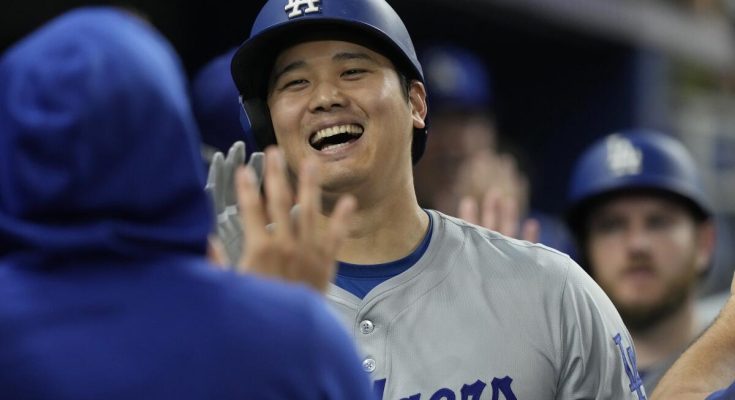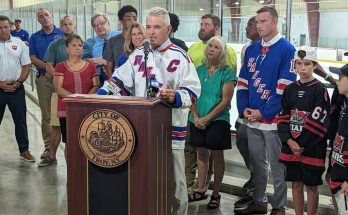The Los Angeles Dodgers, one of Major League Baseball’s most storied franchises, have been navigating a difficult stretch recently, a period marked by unexpected losses and performance inconsistencies that have frustrated fans and analysts alike. In the midst of this turbulence, Shohei Ohtani, the two-way superstar who has transformed the league with his rare combination of elite pitching and hitting, has taken a moment to address the team’s ongoing struggles. His comments, affirming that the Dodgers are “doing everything in our power” to reverse their fortunes, provide both a glimpse into the internal mindset of the clubhouse and a measure of reassurance for a fanbase eager to see their team return to its dominant form. Ohtani, who has been central to the Dodgers’ lineup and pitching rotation, is no stranger to pressure. His ability to perform at a historically high level on both sides of the game has made him a linchpin for Los Angeles, and his words carry significant weight when discussing the team’s efforts to overcome adversity.
The Dodgers’ recent struggles have been multifaceted. Injuries, roster adjustments, and a series of underperformances from both veteran stars and emerging talent have created a challenging environment. The team’s offense, while still potent in moments, has struggled with consistency, often failing to capitalize on opportunities with runners in scoring position. Meanwhile, the pitching staff, usually a cornerstone of the Dodgers’ sustained success, has experienced lapses that have led to critical runs in key games. This combination of factors has allowed opponents to seize momentum in situations where Los Angeles historically would have maintained control. Within this context, Ohtani’s remarks are particularly significant, as they reflect a shared recognition among players and management that overcoming these challenges requires concerted effort and adaptation.
Ohtani’s perspective on the team’s approach to adversity emphasizes a proactive mindset. “Doing everything in our power” suggests that the Dodgers are employing a multi-pronged strategy to address both tangible and intangible issues affecting performance. On the tangible side, this includes adjustments to the lineup, exploring alternative pitching rotations, and leveraging advanced analytics to optimize matchups and in-game strategies. The Dodgers have long been known for their data-driven approach, and this analytical rigor is likely being applied with renewed focus as they seek to identify and rectify inefficiencies. On the intangible side, fostering a resilient team culture is paramount. Ohtani’s comments hint at the internal emphasis on maintaining morale, encouraging communication, and reinforcing the mental toughness necessary to rebound from setbacks. This dual focus on both technical precision and psychological fortitude exemplifies a holistic approach to problem-solving in professional sports.
The role of leadership in navigating a slump cannot be overstated. Ohtani, despite being relatively young, serves as a figure whose work ethic and commitment set a standard within the clubhouse. Veteran leaders within the Dodgers organization, including players like Mookie Betts and Freddie Freeman, also contribute to shaping the team’s response to adversity. Together, this mix of emerging talent and established stars creates a dynamic environment where accountability and support coexist. Ohtani’s public affirmation that the team is fully committed signals to fans and the media that the players are unified in their objective to correct course, a crucial factor in maintaining confidence and focus during a challenging stretch of the season.
Los Angeles fans, who have grown accustomed to witnessing their team compete at the highest levels, are particularly sensitive to periods of struggle. Expectations for the Dodgers are historically high, fueled by years of postseason success and deep playoff runs. In this environment, even short-term difficulties can generate significant scrutiny and speculation about the team’s prospects. Ohtani’s statements, therefore, serve a dual purpose: they are both an internal motivational tool and a public reassurance that the organization is actively confronting its challenges. The balance between transparency and strategic discretion is delicate, but Ohtani’s measured words strike a tone of confidence without overstating the team’s current position, signaling both realism and optimism.
Analyzing the Dodgers’ recent performance trends provides further context for Ohtani’s remarks. The team’s struggles have not been the result of a single weakness but rather a convergence of factors. Key injuries to players have forced adjustments that disrupt established routines, and even minor lapses in timing or execution can cascade into broader performance issues. Pitching inconsistencies have been particularly visible, with starters occasionally failing to maintain expected dominance, while the bullpen has faced high-leverage situations that test depth and resilience. Offensively, fluctuations in hitting efficiency, particularly with runners in scoring position, have compounded challenges. In such a competitive division, where opponents capitalize quickly on mistakes, the margin for error is slim, making the Dodgers’ focused response, as described by Ohtani, essential for maintaining playoff viability.
Ohtani’s own contributions during this period are a testament to his dual-role significance. As a pitcher, he continues to shoulder substantial responsibilities, often entering games in situations that demand precise execution and strategic awareness. Simultaneously, his presence in the lineup as a hitter adds a layer of offensive firepower that can change the trajectory of a game in a single at-bat. This unique combination amplifies both the pressure on Ohtani and his capacity to influence outcomes. By publicly emphasizing the team’s collective effort, Ohtani reinforces the notion that while individual performances are critical, sustained success hinges on coordinated action and mutual support.
In addition to his role on the field, Ohtani’s perspective highlights the broader strategic approach of the Dodgers’ management. General manager operations, coaching adjustments, and data-driven game planning all contribute to the team’s efforts to rectify current challenges. Decisions regarding pitching rotations, bullpen usage, and lineup configurations are informed by both statistical insights and observational analysis, reflecting a nuanced understanding of the game’s evolving dynamics. Ohtani’s acknowledgment that the team is exerting maximum effort suggests a collaborative alignment between players and management, where feedback loops are utilized to iteratively improve performance and adapt to competitive pressures.
The psychological dimension of a slump is often underappreciated but is central to the Dodgers’ current focus. Extended periods of underperformance can erode confidence, exacerbate stress, and affect decision-making during critical moments. Ohtani’s comments imply an awareness of this dynamic and a commitment to fostering resilience. Maintaining mental composure, emphasizing preparation over panic, and reinforcing belief in each player’s abilities are all essential components of sustaining performance under pressure. In professional sports, where outcomes hinge on fine margins, this psychological support structure can be as consequential as physical conditioning or tactical planning.
Looking ahead, the Dodgers’ path out of their current difficulties will likely involve a combination of incremental improvements and strategic recalibrations. Adjustments in player usage, targeted development of emerging talent, and refinement of in-game strategies are all plausible avenues. The team’s depth, bolstered by experienced veterans and versatile younger players, provides options for experimentation and optimization without compromising long-term goals. Ohtani’s affirmation of the team’s proactive efforts signals that these adjustments are underway and that the organization is not complacent in the face of challenges.
Fan engagement and media narrative also play a role in shaping the perception of the Dodgers’ struggles. In a high-profile market like Los Angeles, every game and performance is scrutinized, with narratives quickly emerging around perceived weaknesses or turning points. By publicly articulating confidence and commitment, Ohtani contributes to managing this narrative, framing the team’s struggles as temporary obstacles rather than structural deficiencies. This messaging helps maintain fan trust and fosters a sense of continuity, emphasizing that the Dodgers’ core strengths remain intact despite recent difficulties.
Historically, the Dodgers have demonstrated resilience in navigating slumps and periods of adversity. Their sustained success over the past decade has been characterized by the ability to adapt, innovate, and respond to challenges with strategic acumen. Ohtani’s comments align with this tradition, reflecting a culture that prioritizes problem-solving, collaboration, and the relentless pursuit of excellence. The emphasis on doing “everything in our power” resonates as both a motivational statement and a practical commitment, encapsulating the mindset required to restore performance levels and compete at the highest echelon of Major League Baseball.
Ultimately, Shohei Ohtani’s statement is a reminder of the multifaceted nature of professional sports challenges and the importance of a comprehensive response. Addressing the Dodgers’ struggles involves tactical adjustments, player development, mental resilience, and effective communication across all levels of the organization. Ohtani’s unique position as a dual-role superstar amplifies the impact of his perspective, signaling that even in the face of setbacks, the team is united, strategic, and committed to reclaiming its competitive edge. As the season progresses, fans and analysts alike will be closely watching the results of these concerted efforts, taking cues from both performance outcomes and the ongoing leadership exemplified by players like Ohtani.
In conclusion, Shohei Ohtani’s affirmation that the Dodgers are “doing everything in our power” to overcome their struggles encapsulates the essence of the team’s response to adversity. It reflects a holistic approach that combines tactical precision, data-driven decision-making, mental fortitude, and leadership cohesion. While the challenges faced by Los Angeles are real and complex, the public commitment from a player of Ohtani’s caliber underscores a determination to address each obstacle methodically and collectively. For a team with championship aspirations and a rich legacy, this mindset is critical, signaling to fans, media, and competitors alike that the Dodgers remain a formidable force, poised to navigate their current difficulties and reclaim the momentum necessary for sustained success.
The road ahead will undoubtedly present additional tests, from high-pressure matchups within the division to the physical and mental demands of a long season. Yet, with a foundation built on elite talent, strategic innovation, and resilient leadership, the Dodgers are well-positioned to respond effectively. Ohtani’s words serve as both reassurance and motivation, encapsulating the team’s commitment to confronting adversity head-on and demonstrating that, even amid struggles, the pursuit of excellence remains unwavering. The narrative of this season, shaped by both challenges and triumphs, will be informed by how effectively the Dodgers translate their efforts into performance, and Ohtani’s perspective offers a clear lens through which to view their determined approach.
This holistic approach, characterized by preparation, collaboration, and adaptability, may ultimately define the trajectory of the Dodgers’ season. Shohei Ohtani, as a symbol of excellence and perseverance, embodies the team’s aspiration to rise above difficulties and reaffirm its status as a perennial contender. His comments resonate beyond the field, offering insight into the mindset of a championship-caliber organization and reinforcing the belief that with dedication, strategic effort, and unity, the Dodgers can overcome their struggles and regain the momentum that has long defined their identity in Major League Baseball.



